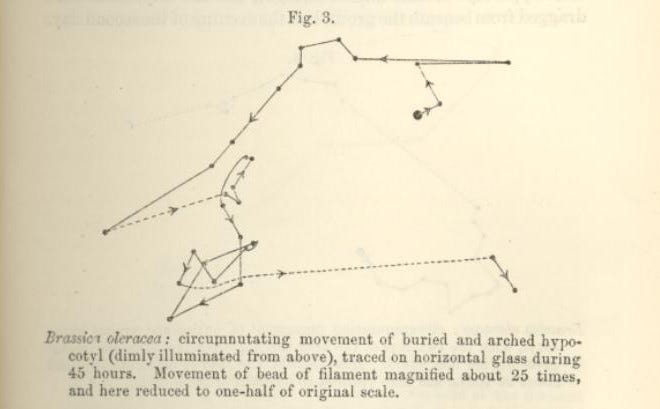#103: I believe in running

Charles Darwin spent 45 hours tracing the circumnutating movement of a certain brassica. He also had insomnia. From The Power of Movement in Plants (1880)
Happy Friday!
This week I believe in running.
This Sunday I'll be running the Gosport Half Marathon for the third consecutive year.
I'm not quite sure why. I have no particular connection or affection for Gosport, aside from this one annual occasion.
It is, however, the largest town in Britain without an operational railway station, but that's not reeeally a good reason to run there.
No. Running the Gosport Half is just one of those young rituals without which November is now unthinkable.
Actually, emend that last sentence: the calendrical absence of the Gosport Half would make the entire russet spread of Autumn barren indeed.
Running is not the kind of master that rewards the ill-prepared, so the Gosport Half must begin with a spike in training by September at the latest.
This year training began in October; this year I expect a slower time.
As a confirmed relativist, I believe that physical exercise is as close as we come to an absolute moral good.
Unlike the sessile (to show off a new word) plants, we humans were made to move. That's why we have Achilles heels, thermoregulation and well-developed bottoms.
Apes are rubbish at running; dogs tank out at 7 miles; and a decent marathon runner is not much slower over that distance than a racehorse, a beast whose genetic inheritance is to run.
As such, there is an honesty in exercise that is disturbingly hard to find, at least in my other work.
My annual pilgrimage to the south coast gives me an opportunity to measure myself against myself. Can I break last year's personal best?
Certainly not without being honest to the process, and by training hard throughout the year. Nothing holds you to account like a stopwatch.
Running gets me out of bed in the morning. Running is therapy with sweatbands. Physical training is mental training. Sweat is its own gold.
Running gives us a inarguable measure of our mortality.
On the optimistic side, I am 36 years old and I can run faster and further today than I could ten years ago. It's always good to feel like we're making progress in life.
There are, too, plenty of older runners quicker than me: next year I could be running faster still than I do today. At my local Parkrun last week 7 runners older than me ran a quicker 5km than my personal best time.
Eventually, though, I know that my times will begin to drift, like the tide receding both imperceptibly and indubitably away from the shore.
No one can resist the tidal pull of time; but we can prepare ourselves.
And so back to Gosport.
Further Running/Reading:
Haruki Murakami: What I Think About When I Think About Running | The novelist explains the correspondence between putting strides down on the pavement and putting words down on the page. Link is to my review.
Christopher McDougall: Born To Run | Why humans love endurance running, and how the Tarahumara can run 100 miles at speed without injury.
Scott Jurek: Eat & Run | A record-breaking vegan ultramarathon runner tries to explain.

FICTION-NON-FICTION
Snippets from my reading.
FICTION
Titus Groan by Mervyn Peake (1946)
'Slagg,' said the Countess, 'go away! I would like to see the boy when he is six. Find a wet nurse from the Outer Dwellings. Make him green dresses from the velvet curtains. Take this gold ring of mine. Fix a chain to it. Let him wear it around his wry little neck. Call him Titus. Go away and leave the door six inches open.'
NON-FICTION
What A Plant Knows by Prof. Daniel Chamovitz (2012)
Plants are acutely aware of the world around them. They are aware of their visual environment; they differentiate among red, blue, far-red, and UV lights and respond accordingly. They are aware of aromas surrounding them and respond to minute qualities of volatile compounds wafting in the air.
Plants know when they are being touched and can distinguish different touches. They are aware of gravity: they can change their shapes to ensure that shoots grow up and roots grow down.
And plants are aware of their past: they remember past infections and the conditions they've weathered and then modify their current physiology based on these memories.
If a plant is aware, what does this mean for us regarding our own interactions with the green world?
For those of you bemoaning the end of our reading of Viktor Frankl, you can find on my shiny new website a shiny new page entirely dedicated to Man's Search for Meaning, complete with an index to all 28 Days of the 5-a-Day Book Cult. It got so popular when I shared it on Reddit that my website went down for 27 minutes on Wednesday. So that's nice.
For those of you actually losing your shit over no Frankl this week, may I decorously direct you to Jocko Willink? Tough guys reading out loud from a Holocaust memoir. Brilliant.
Thanks for the loan of your eyeballs, and may you have a glorious weekend!
Much love,
- dc

CREDITS
David Charles wrote this newsletter. David is co-writer of BBC Radio sitcom Foiled, and also writes for The Bike Project, Elevate and Thighs of Steel. He can be found at davidcharles.info and on Twitter @dcisbusy

By Rodrigo Pinheiro . Via Kottke.org.

